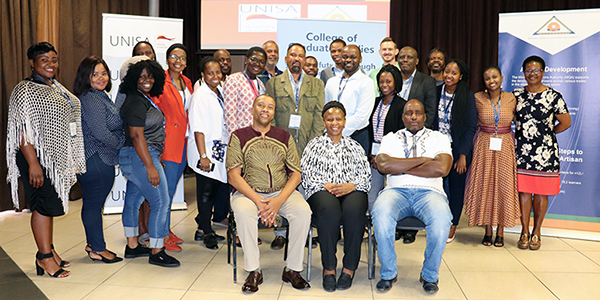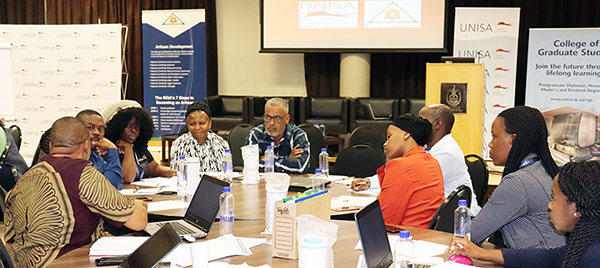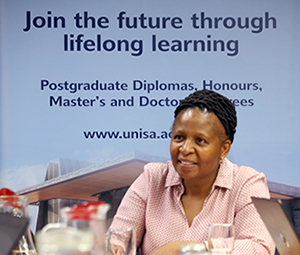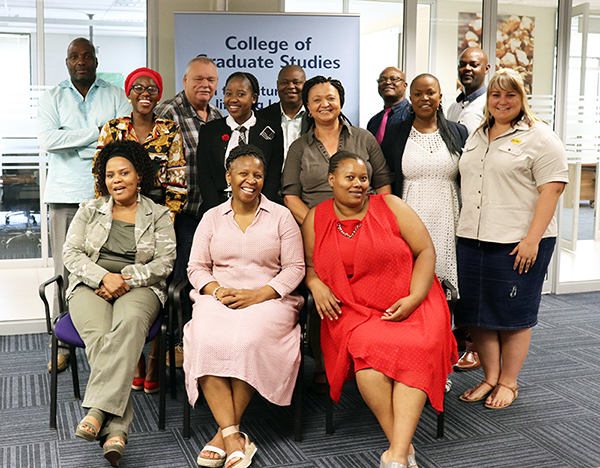
Occupational injuries and ill-health in the Mining and Minerals Sector (MMS) have huge social and economic implications for individuals, their families and communities. Could understanding the occupational health and safety (OHS) matters in the South African MMS lead to zero harm?

Participants at the first stakeholder workshop with (seated) Xolisa Njikelana (Learning Programmes Operation Manager: MQA), Prof Lindiwe Zungu (Executive Dean: College of Graduate Studies and project leader) and Dr Joseph Komane (Research Specialist: MQA)
Unisa, in collaboration with the Mining Qualifications Authority (MQA), ventured on a discovery journey to engage stakeholders on current health and safety issues in the MMS. Furthermore, the skills required to deal with mine health and safety matters and possible academic programmes or qualifications that can be designed to deal with some of these factors were discussed.
As part of a research study aimed to gain insight into the health and safety measures in MMS, two stakeholder engagement workshops took place at the beginning of the year, at the Unisa Muckleneuk Campus and at the MQA office in Parktown, Johannesburg.

Focus group discussion
The stakeholders included health and safety managers and representatives, human resources and skills development managers, mine managers, employees, union representatives and representatives from the Department of Mineral Resources.
The objective was to discuss the different issues encountered in the mines concerning health and safety that continue to impact on the industry’s ability to reach its zero-harm goal. The stakeholders’ input will be utilised to assess the current issues on OHS in the sector and how education can play a part in dealing with OHS issues. This will be compiled into a report inclusive of OHS development skills.

Prof Lindiwe Zungu, Executive Dean: College of Graduate Studies and project leader
"This is a critical exercise because whatever recommendations that will be put forward to MQA will be implemented to ensure that skills in the sector are addressed effectively. It is envisaged that the study will provide practical recommendations for the MQA and other industry stakeholders to consider in order to address the current or future expected skills shortages and gaps in the MMS related to OHS skills. This will ensure that there are competent employees, supervisors, and leadership that will drive the agenda of OHS, all in pursuit of achieving a zero-tolerance harm in the mining and minerals sector," said Prof Lindiwe Zungu, Executive Dean (ED) of the College of Graduate Studies and Project Leader.
The ED’s research interests are in health, safety and wellness promotion in the workplace.
The MQA is a Sector Education Training and Authority (SETA) responsible for administering skills development programmes for the mining and mineral sector in South Africa.
As a component of the research agenda within the MQA, the skills development plan has made this project a priority. With the current interventions in place, accidents and fatalities are still happening. This leads to the question whether the present measures implemented respond to committed behaviour change within MMS so as to manage the reduction of accidents and fatalities.
"This research project responds to the question whether what the MQA is doing is still relevant. Is there anything else we should be doing to enable behavioural change in the sector to see meaningful reduction of fatalities and accidents in the mines," said Xolisa Njikelana, Learning Programmes Operation Manager of the MQA.

Project team and participants at the second stakeholder workshop
In the research study, factors that contribute towards fatalities in the mining sectors, issues that influence health and safety practices, and interventions will be investigated. This will be followed by recommendations that lead to zero harm in the mining sector.
As part of mending the Sector Skills Plan, the MQA has developed a research agenda inclusive of the issue of OHS in the MMS. "That is why MQA has partnered with Unisa, so that together, we can conduct research that will inform our decisions for funding projects such as the OHS skills development programme," said Dr Joseph Komane, Research Specialist, MQA.
The goal of occupational health is to be proactive, to prevent any occurrence (or forms) of ill health from exposure to various hazards in the workplace. There is a need to methodically identify occupational hazards correctly and timely, rank them accordingly in terms of the level of risks associated with them and put in place interventions that will cause no harm.
"If we want to accelerate the goal of reaching zero harm in MMS, we need to look at where we are now and where we have been," said Zungu. This will correct the status quo of OHS going forward.
* By Mpho Moloele, PR and Communications Assistant, Department of Research, Innovation, and Commercialisation
Publish date: 2020-04-30 00:00:00.0